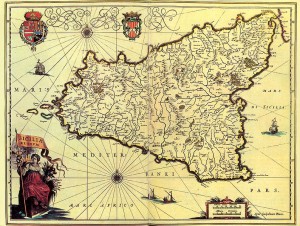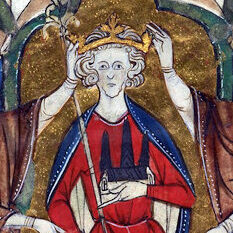1254

The other piece of business the king concluded while in Gascony had to do with Sicily. Considered a rich prize at the time, the island was up for grabs following the death of Henry’s other brother-in-law Frederick in 1250. As the emperor of the Germans and King of the Romans, Frederick II had been at war with a succession of popes for possession of southern Italy and Sicily. Henry had originally bargained on an alliance with Frederick as a way of forcing Louis to give back Normandy. He married his younger sister Isabella to the twice-widowed older man, promising him 30,000 marks to boot, but nothing came of this strategy except another Henry (born to Isabella, who later died in childbirth). Frederick’s older sons Conrad and Manfred, also from previous alliances, were ready to carry on the fight with Pope Innocent IV, who by that time was desperate for anyone to rid him of these infernal Germans. Henry looked like an easy target. His desire for Normandy was common knowledge and Sicily had once been a Norman possession. Still, he was uneasy about waging war on his nephew and namesake. Then both the younger man and Conrad died in 1254, and Henry took the papal bait.

The offer was first made to the brothers. Richard was approached because he could afford it, but he didn’t get rich by investing in outlandish schemes. He was wary of alienating the papacy, however, and got out of it by insisting that the pope hand over hostages from his family as security. The offer next went to Charles of Anjou, who had infuriated his brother Louis by playing dice while on crusade. Tired of squabbling with his mother-in-law over measly little Provence, Charles would have jumped at the opportunity had he enjoyed Richard’s wealth. It was just a matter of time.
Nephew Henry died first and the pope tried to spur his uncle into action by claiming that Conrad had murdered him. Then Conrad fell ill and died, presumably of malaria, but a report went around that he had been poisoned. Seeing Pope Innocent as anything but innocent in this matter, Manfred fled to Lucera, a Saracen stronghold in Italy established by his father Frederick. With the backing of his Muslim allies, Manfred marched forth and defeated the papal host at Foggia in December 1254.